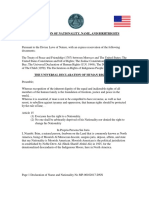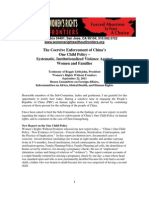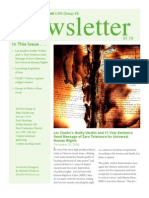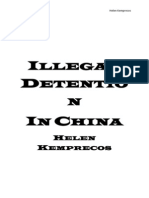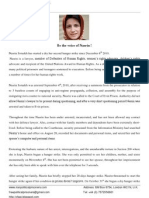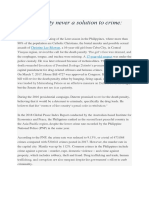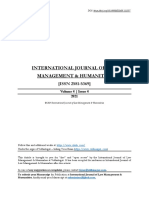Group 48 Newsletter - November 2012
Group 48 Newsletter - November 2012
Uploaded by
Joanne LauCopyright:
Available Formats
Group 48 Newsletter - November 2012
Group 48 Newsletter - November 2012
Uploaded by
Joanne LauOriginal Description:
Copyright
Available Formats
Share this document
Did you find this document useful?
Is this content inappropriate?
Copyright:
Available Formats
Group 48 Newsletter - November 2012
Group 48 Newsletter - November 2012
Uploaded by
Joanne LauCopyright:
Available Formats
1 CHINA: Urgent ActionChen Guangchengs Nephew still detained
Newsletter
Amnesty International USA Group 48
CHINA: Urgent Action - Chen Guangcheng's Nephew still detained
Chen Kegui
11.12
Fabio Bueno Stock.Xchng
3 Sentenced to death for not correctly filling out a form! 4 RWANDA: End Torture and Illegal Detentions 6 CHAD: We are all dying here - End Human Rights Violations in Prisons 8 Guantnamo: 10 years of human wrongs 9 El Salvadorian President Must Recognize State Role in Massacre AIUSA-Group 48 http://aipdx.org 503-227-1878 Next Meeting: Friday November 9th First Unitarian Church 1011 SW 12th Ave 7:00pm informal gathering 7:30pm meeting starts
NewsLetter Designed By Michelle Whitlock MichelleWhitlock.com
ing officials in China). They were also informed that the original charge of activist Chen Guangcheng, has been detained since 30 April. On Oct 15, Am- suspicion of intentional homicide which they were originally told was the nesty International was informed that police have submitted Chen Keguis case reason for his detention had been dropped. Police are now proposing to to the prosecuting officials. As charge him with inflicting intentional such, he could face trial soon. He still injury, which can result in a sentence has no access to his lawyers or family. of less than three years imprisonment, He is at risk of torture or ill-treatment or between three to 10 years in in custody. serious cases. After 7 October, following the national holiday period in the Peoples Republic According to his family, Chen Kegui has of China where all government depart- not been allowed to meet the lawyers chosen by his family since he was ments are closed, the family of Chen detained on 30 April. He has also had Kegui went to the authorities to push for information on his case. The officials no access to family since he has been told them that his case had been moved in detention. Amnesty International believes Chen Kegui is at risk of torture by police from the investigation stage while he is in detention. to the procuratorate (the prosecut-
Chen Kegui, nephew of human rights
AIUSA group 48 Newsletter November 2012 Pg 2
Please write immediately in Chinese or your own language: Demanding the authorities give Chen Kegui the right to choose his own legal representation, and ensure that lawyers are able to mount a defence free from harassment or intimidation; Calling on the authorities to either release Chen Kegui or formally charge him and try him in proceedings respecting international fair trial standards; Calling on the authorities to ensure that Chen Kegui is not subjected to torture or other ill-treatment and to immediately cease all harassment of Chen Keguis family. Chen Kegui was detained on 30 April, after days of fleeing for his safety following a violent raid on his familys home on 26 April.
Additional Information
Telephone: +86 531 8301 1062 Fax: +86 531 8301 2514 Email: webmaster@sdjcy.gov.cn Salutation: Dear Procurator Secretary of the Shandong Provincial Party Committee Jiang Yikang Shuji Zhonggong Shandongsheng Weiyuanhui 482 Jingyilu Shizhongqu, Jianashi 250001 Shandongsheng Peoples Republic of China Telephone: +86 531 8793 5501 Email: icc@npc.gov.cn Salutation: Dear Secretary
Copies to
Ambassador Zhang Yesui This raid which happened just days after Chen Keguis uncle, Embassy of the Peoples Republic of China human rights activist Chen Guangcheng, escaped from years 3505 International Place, NW Washington DC 20008, USA of illegal house arrest was conducted by around 20 plainTel: 202 495-2266 clothed individuals who failed to show any identification Fax: 1 202 495-2138 or search warrant. According to those present, Chen Kegui picked up a knife in self defence and injured several of the Email: chinaembpress_us@mfa.gov.cn intruders, before fleeing the house. On 9 May, Chen Keguis family was notified that he was arrested on suspicion of inAIUSA Group 48 Contact Information tentional homicide. After the raid, Chen Keguis father was taken into custody where he was allegedly tortured by police who chained his legs, beat him in the ribs and whipped him with belts. Upon revealing details of his torture to the media after his release on 29 April, Chen Keguis father was told by officials that his son Chen Kegui would receive an even harsher punishment. Chen Kegui has been detained incommunicado for more than five months. PLEASE SEND APPEALS BEFORE 27 NOVEMBER 2012 To: Chief Procurator of the Shandong Provincial Peoples Procuratorate Wu Pengfei Jianchazhang Shandongsheng Renmin Jianchayuan Hepinglu Dongsou, Jinanshi 250014 Shandongsheng Peoples Republic of China
Action
Group Coordinator Joanne Lau jlau@easystreet.net Treasurer Tena Hoke tena.hoke@gmail.com Newsletter Editor Dan Webb write_to_dan@yahoo.com Concert Tabling Will Ware ww_ware@yahoo.com Legislative Coordinator Dan Johnson daniel.p.johnson@gmail.com Indonesia Max White maxw33@comcast.net Central America Marylou Noble marylou_noble@ yahoo.com Darfur (Sudan) Marty Fromer martyfromer@gmail.com North Korea Erica Swiberg eswiberg@gmail.com
Prisoners Cases Jane Kristof Central Africa / OR State kristofj@pdx.edu Cornelia Cerf Death Penalty Abolition Ron Noble Terrie Rodello ronald0216@yahoo.com tarodello@igc.org
AIUSA group 48 Newsletter November 2012 Pg 3
Sentenced to death for not correctly filling out a form!
By Max White
Michaela Kobyakov Stock.Xchng
Pakistan Embassy, in violation of the Vienna Convention on Consular Relations. Zulfiqar Ali was only allowed access to a lawyer one month after his arrest and states that he was beaten almost daily from the date of his arrest to 21 January 2005 by officers from the Bandara Soekarno-Hatta district police (Polres). He also said that he was tortured and otherwise ill-treated in detention until he signed a confession. He later needed stomach and kidney surgery because of the beatings, and is now in poor health. The prohibition of torture is absolute in international law; it applies to all states at all times and in all circumstances, without exception. Zulfiqar Alis appeals to the High Court and to the Supreme Court were rejected and he remains under sentence of death. Reportedly, no material evidence has ever been brought against him. Denied a fair trial, he now faces execution, and remains at Kedung Pane Prison in Central Java Province.
Action
Detained for almost eight years, Zulfiqar Ali, a textile worker
from Pakistan , was sentenced to death in June 2005 after an unfair trial. The only legal avenue open to him now is to appeal to the President of Indonesia for clemency. Zulfiqar Ali, who came to Indonesia in 2000, was arrested at his home in West Java Province on 21 November 2004. He was charged with possessing 300g of heroin and tried by the Tangerang District Court, Banten Province, on 20 January 2005. Five months later, on 14 June, he was sentenced to death by the same court. The court rejected a witness statement, which admitted that the drugs did not belong to Zulfiqar Ali, because the statement had not been dated.
Please write or fax: Attorney General of the Republic of Indonesia Jl. Sultan Hasanudin No.1 Kebayoran Baru During his pre-trial detention, Zulfiqar Ali was denied a law- Jakarta Selatan 12160 Indonesia yer. Access to a lawyer from the outset of detention is a key Fax: +62 21 725 0213 / +62 21 739 2576 safeguard against torture and other ill-treatment, and essential to ensure a fair trial. Ask the Attorney General to Stop the execution of Zulfiqar Ali by whatever means The right to a fair trial is set out in Article 14 of the Internaavailable; tional Covenant on Civil and Political Rights, acceded to by Ensure that Zulfiqar Ali is re-tried in proceedings that comIndonesia in 2006. It requires that the accused has access to ply with international fair trial standards; a lawyer not only during the trial itself, but also immediately Investigate the reports of torture and other ill-treatment, on arrest, during detention, interrogation and preliminary investigations. This is also reflected in the Indonesian Crimi- and ensure that all statements resulting from such coercion nal Procedure Code which states, legal counsel shall have the are completely excluded from any re-trial; right to contact a suspect from the moment of his arrest or Suspend all executions and the imposition of death sendetention at all stages of examination. tences as a step towards total abolition of the death penalty; Denied access to a lawyer, Zulfiqar Ali did not have adequate Revise the Indonesian Criminal Code and other laws and time and facilities to prepare a defence. During his arrest change policies and practices to ensure fair trials in line with and detention, he was also refused the right to contact the international standards.
AIUSA group 48 Newsletter November 2012 Pg 4
NOTE: More than 100 people are on death row in Indonesia, Over half have been convicted of drug trafficking; many are foreign nationals. No executions have taken place in Indonesia since 2008 when 10 were carried out. At least six people were sentenced to death in 2011. The Indonesian Constitution prohibits torture, but torture by police is widespread
and forced confessions are routinely relied upon in court. Indonesia has yet to make torture a criminal offence. Those charged with crimes carrying the death penalty can be held for up to 231 days before being tried. There are serious concerns around corruption and lack of independence within the judiciary.
RWANDA: End Torture and Illegal Detentions
Write apolite letter to the following US government officials about the issues mentioned in this report. Amnesty International believes that pressure should be applied to the appropriate donor nation authorities, such as the US Government, on the following points: Ensure all detainees, including those held by the military and intelligence services, are examined by an independent doctor as soon as they are arrested and have ongoing access to medical care while in detention; Ensure that all detainees, including military, are given access to legal counsel from the outset of detention and have access to legal counsel during all interrogations; Immediately undertake a public and impartial investigation into the use of safe houses as secret detention sites and the detention of civilians in military detention facilities, and ensure mnesty International has produced two reports dealing prompt and impartial investigations of allegations of torture with illegal detention and torture in Rwanda. The first, Briefand other ill-treatment in these detention places; ing to the UN Committee Against Torture (AFR 47/003/2012), Issue a public notice with full information about all places was issued in May of 2012. It details cases of people illegally of detention, including their location, and stop detaining imprisoned, or even legally imprisoned, and then tortured. people in places that are not been officially registered places On October 8, 2012, the second report, Rwanda: Shrouded of detention; in Secrecy - Illegal detention and torture by military intelligence, was released and extends the May report with detailed Suspend any agents, including military officers, suspected instances of human rights violations. of being involved in acts of torture or other cruel, inhuman or degrading treatment or punishment, including officials who Shrouded in Secrecy documents more than 45 cases of have instigated, ordered, consented, acquiesced, condoned unlawful detention and 18 allegations of torture or other illor otherwise participated in such acts of torture or other illtreatment by Rwandan military intelligence in 2010 and 2011. treatment, regardless of rank pending the outcome of imparSome individuals who disappeared remain in secret detential and independent investigations and ensuing prosecutions; tion in 2012. Amnesty International believes that the actual During bilateral or diplomatic meetings, donor officials or number of people who were detained and who were at risk of, or subjected to, torture and other ill-treatment during this diplomats should raise the issue of the Rwandan militarys domestic human rights record with the Rwandan authori- period is higher than those documented in the report
Action
Nick Cowie Stock.Xchng
AIUSA group 48 Newsletter November 2012 Pg 5
ties. This call could be framed in relation to Rwandas recent examination by the Committee against Torture; It is important to focus their requests to the Rwandan government on ratifying the International Convention for the Protection of All Persons from Enforced Disappearance. Letters should be politely written and include a return address. If any reply to your letter or email is received, please contact the AIUSA Central Africa Rwanda Team at ai.centralafrica@ gmail.com before responding. We would be grateful to review the content of the official response before deciding how to reply. The Honorable Hillary Rodham Clinton Secretary of State U.S. Department of State 2201 C Street NW Washington, DC 20520 USA Ambassador Susan Rice United States Mission to the United Nations 799 United Nations Plaza New York, N.Y. 10017 Mr. Johnnie Carson Assistant Secretary of State for Africa U.S. Department of State 2201 C Street NW Washington, DC 20520 His Excellency Ambassador James Kimonyo 1714 New Hampshire Ave NW Washington, DC 20009 Email: info@rwandaembassy.org Fax: 1 (202) 232-4544 Salutation: Dear Ambassador Dear, _______ As a member of Amnesty International, I wish to express my concern about the allegations of human rights violations against detainees in Rwanda. As you know, Rwanda is a recipient of millions of dollars in US foreign aid. This
Sample Letter Copies To Letters To
month, Amnesty International researchers published a report on human rights abuses against detainees entitled, Rwanda: Shrouded in Secrecy. Illegal Detention and Torture by Military Intelligence. It reveals a disturbing pattern. Individuals are reportedly arrested by military or law enforcement agents, but family members and others are unable to find out their whereabouts or any reasons why they were abducted. In many cases, family members could not even find out if their loved ones were alive or dead. Although Rwanda claims to be a country governed by the rule of law, these detentions by the Rwandan military are an egregious violation of universal human rights and violate Rwandas own laws on the legal rights of prisoners. Since the Rwandan government does receive aid from the US government, I thus ask you to pressure Rwanda to do the following: Ensure all detainees, including those held by the military and intelligence services, are examined by an independent doctor as soon as they are arrested and have ongoing access to medical care; Ensure that all detainees, including military, are given access to legal counsel from the outset of detention and have access to legal counsel during all interrogations; Immediately undertake a public and impartial investigation into the use of secret detention sites and the detention of Postage Rates
Within the United States $0.31 - Postcards $0.45 - Letters and Cards up to 1 oz. To Canada $0.80 - Postcards $0.80 - Airmail Letters and Cards up to 1 oz. To Mexico $0.84 - Postcards $0.84 - Airmail Letters and Cards up to 1 oz. To all other destination countries $1.05 - Postcards $1.05 - Airmail Letters and Cards up to 1 oz.
AIUSA group 48 Newsletter November 2012 Pg 6
civilians in military detention facilities, and ensure prompt and impartial investigations of allegations of torture and other ill-treatment; Issue a public notice with full information about all places of detention, including their location, and stop detaining people in places that are not been officially registered places of detention; Suspend any agents, including military officers, suspected of being involved in acts of torture or other cruel, inhuman or degrading treatment or punishment, including officials who
have instigated, ordered, consented, acquiesced, condoned or otherwise participated in such acts of torture or other illtreatment, regardless of rank pending the outcome of impartial and independent investigations and ensuing prosecutions; It seems reasonable to me for my government to demand accountability from Rwanda, especially as its government has signed off on international human rights conventions and has laws that protect the rights of prisoners and legal detainees. Sincerely,
CHAD: We are all dying here - End Human Rights Violations in Prisons
are no specific facilities for children, who are detained in the same cells as adults. In some prisons there was no separation between women and mens courtyards putting them at significant risk of genderbased and sexual violence. Even in prisons where women had separate accommodation it was easy for male prisoners and guards to move to and from the womens courtyard and cells. Chads prisons sometimes operate at 130% above their intended capacity. Please ask the Chadian authorities to insure that living conditions in prisons are compatible with human dignity and respect human rights. The Chadian authorities should provide a clean and hygienic environment for all those held in its prisons. This should include: Providing clean water and adequate sanitation facilities;
Action
Amir Darafsheh Stock.Xchng
On September 10, 2012, Amnesty International released the
report Chad: We are all dying here Human Rights violations in prisons (AFR 20/007/2012). Prison conditions in Chad are harsh, and far below international standards. Most prisons are very old, dilapidated and overcrowded. Prisoners basic human rights, including the right to security of persons and freedom from cruel, inhuman and degrading treatment or punishment are often violated.
Insuring that prisoners from the overcrowded Amsinene prison in NDjamena are transferred to other adequate facilities in NDjamena taking into consideration the individual needs of the prisoners; Insuring that each prison is provided with a clinic with Amnesty International visited six prisons in 2011 and 2012. available basic medicines and equipped with basic medical All were severely overcrowded. Some prisoners are victims emergency facilities such as gloves, laboratory kits, etc; of acts amounting to cruel, inhuman or degrading treatment Making at least one qualified medical doctor available to or punishment by prison staff or other inmates, including conduct regular clinic work at each prison, putting in place members of prison gangs who enjoy almost total impunity. Prisoners have very limited access to medical and health care; effective legislation for the implementation of the October 4, 2011 Ordinances On Prisons and making sure that all prison they lack food, drinkable water, adequate sanitary facilities, and other basic necessities such as bedding and clothes. There staff are informed about the ordinances;
AIUSA group 48 Newsletter November 2012 Pg 7
Harmonizing the working relations between the National and Nomadic Guard of Chad (Garde Nationale et Nomade du Tchador GNNT) and the gendarmerie in charge of the prisons by issuing clear orders to all prison directors and the GNNT that clarify how they are to work together to improve prison management. Please write letters or faxes to the Government of Chad. Emails to Chad are not ideal since Chadian websites are not reliable for delivering Contact us emails and personal emails for officials are often blocked when criticism comes en masse. Postcards, faxes, and regular mail are preferable. The following sample letter can be reproduced for signatures, but activists are urged to format and write their own if they can. Letters can be written in English, but if members can write in French that is excellent too. Targets for this letters are the President Idriss Dby Itno. A sample letter follows. Your Excellency, I am writing to you about Amnesty Internationals recent research report concerning prison conditions in Chad. I was alarmed to hear that prison conditions in Chad are harsh, dilapidated and severely overcrowded, and that the basic human rights of prisoners are not protected. This is in direct violation of your countrys international human rights treaty and legal obligations. Amnesty International visited six prisons in 2011 and 2012 and observed that prisoners are victims of acts amounting to cruel, inhuman or degrading treatment or punishment by prison staff or other inmates, including members of prison gangs who enjoy almost total impunity. Prisoners have very limited access to medical and health care; they lack food, drinkable water, adequate sanitary facilities, and other basic necessities such as bedding and clothes. There are no specific facilities for children detained in the same cells as adults. In some prisons there is no separation between women and men, putting prisoners at risk of gender-based sexual violence. Please use your influence to insure that living conditions in prisons are compatible with human dignity and respect
Sample Letter
human rights. There should be a clean and hygienic environment for all, including clean water and adequate sanitation facilities. Prisoners from the overcrowded Amsinene prison in NDjamena should be transferred to other adequate facilities in NDjamena taking into consideration the individual needs of the prisoners. Each prison should be provided with a clinic with basic medicines and medical emergency equipment such as gloves and laboratory kits, and at least one qualified medical doctor available to conduct regular clinic work. You need to put in place effective legislation for the implementation of the October 4, 2011 Ordinances On Prisons and make sure that all prison staff is informed about the ordinances. Finally, you need to harmonize the working relations between the Garde Nationale et Nomade du Tchadand the gendarmerie in charge of the prisons by issuing clear orders to all prison directors and the GNNT that clarify how they are to work together to improve prison management. Thank you for your attention to my sincere concerns in this matter, -Amnesty Member His Excellency Idriss Dby Itno President of Chad Prsidence de la Rpublique BP 74 NDjamena Rpublique du Tchad Fax: 011 00235 251 45 01 Salutation: Your Excellency Please also fax, email or mail a cc: of your letter to Chads Ambassador to the United States at: His Excellency Matine Djoumbe Ambassador Extraordinary and Plenipotentiary of the Republic of Chad Embassy of the Republic of Chad 2401 Massachusetts Avenue NW Washington DC 20008 http://embassyofchad.info/index.php/en/ FAX (202) 758-0431
Copies To Letters To
AIUSA group 48 Newsletter November 2012 Pg 8
Guantnamo: 10 years of human wrongs
shlomi kastoryano Stock.Xchng
al-Qaida camp, where they allege he associated with al-Qaida members. In 2010, the US District Court judge looking at Musaab Al Madhwanis petition challenging the legality of his detention, gave the government the benefit of the doubt. Describing his ruling as a very close case, this federal judge concluded that Musaab Al Madhwani was at best, a low-level al-Qaida figure who apparently never finished his weapons training, never fired a weapon in battle and never planned, participated in, or even knew of any terrorist plots. In May 2011, the US Court of Appeals upheld the ruling. The District Court judge found Musaab Al Madhwanis allegations of abuse during detention and interrogation in Afghanistan to be credible. Yet the evidence that he was subjected to the crimes, under international law, of enforced disappearance and torture in US custody prior to his transfer to Guantnamo, have apparently resulted in no criminal investigations, in violation of the USAs international legal obligations.
Musaab Omar Al Madhwani has spent almost a third of his
The story began on 11 September 2002, when he was arrested in an apartment in Karachi by the Pakistani security forces. He said he was tied up, blindfolded, beaten with a rifle and threatened with death. Around five days later he was handed over to US forces and flown to Afghanistan, where he spent about a month in a secret US-operated facility in or near Kabul.
life in US custody. Now 32-years-old, the Yemeni national has been held at the US detention in Guantnamo Bay, Cuba, for more than a decade.
During this time he says he was subjected to torture and other Tip of the iceberg ill-treatment, including sleep deprivation, stress positions and Musaab Al Madhwanis story illustrates the injustice wrought under the USAs global war framework, and how destructive dousing with cold water. to human rights principles that framework continues to be. In late October 2002, Musaab Omar Al Madhwani was sent to More than 150 men are still held at Guantnamo. Many have Guantnamo from the US air base at Bagram, where he had been subjected to more abuse and endured a further five days claimed they were subjected to torture and other ill-treatment in US custody. of illegal detention. There has been little accountability for these human rights Legal Limbo violations and the US administration systematically blocked It would be another two years before he would get access to attempts by former detainees to seek redress for such a lawyer, and nearly six before the US Supreme Court was to violations. rule that he and others held at Guantnamo had the right to challenge in court the lawfulness of their detention. Only one of the 779 detainees held at the base since January 2002 has been transferred to the mainland USA for prosecuMusaab Al Madhwanis habeas corpus petition was finally considered in 2010. More than 10 years after being taken into tion in an ordinary federal court. custody, he has not been charged with any crime by the USA, Others have faced prosecution in military commissions in which claims the right to hold him indefinitely in the name of proceedings that do not meet international fair trial stanits global war against al-Qaida and associated groups. dards. The administration currently intends to seek the death penalty for six of the men after such trials, in clear violation of The US authorities claim that in 2001 Musaab Al Madhwani international law. travelled to Afghanistan to receive firearms training at an
AIUSA group 48 Newsletter November 2012 Pg 9
Some detainees, who have been cleared for transfer from Guantnamo by the US government, cannot be sent back to their home countries because they would face further abuse there. However, because the US authorities refuse to allow any released detainee into the mainland USA, they remain at Guantnamo until a third country solution is found, which can take years. A reminder of the cruelty of this indefinite detention regime came in September 2012, with the news that Yemeni national Adnan Farhan Abdul Latif had become the ninth inmate known to have died at Guantnamo. He had been held without charge or trial for more than a decade. According to the US military authorities, six of the previous eight deaths were the result of suicide and two from natural causes. Adnan Latif had arrived in Guantnamo in January 2002 after the Pakistani police seized him in December 2001, near Pakistans border with Afghanistan, and handed over to US custody. He had been held in the naval base ever since, despite his mental and physical health causing considerable concern over the years. I am a prisoner of death, he told his lawyer, after a US Court of Appeals overturned a District Court judges find-
ing that he was unlawfully held and should be released.
The future of Guantnamo
Adnan Latif s death should send a strong message about the illegality of the detention centre. The death of Adnan Latif should underline to all political and judicial officials in the USA, of whatever political persuasion or judicial philosophy, the cruelty of the Guantnamo regime, its incompatibility with international human rights law and principles, and the urgent need to close Guantnamo and to resolve the detentions in line with international human rights law and standards, said Rob Freer, USA researcher at Amnesty International. On his second full day in office, President Obama committed his administration to closing the Guantnamo facility by 22 January 2010 at the latest. He described the prison as a misguided experiment, adding that by any measure, the costs of keeping it open far exceed the complications involved in closing it It remains open more than two-and-a-half years later. The US authorities must urgently take action to correct this decade of human wrongs. Bringing those still held in Guantanamo to a fair trial in independent civilian courts, or releasing them, is part of what international human rights principles demand of the USA.
El Salvador must finally deliver justice for a brutal massacre
El Salvadorian President Must Recognize State Role in Massacre: Three Decades Later, El Calabozo Murderers Still Not Brought to Justice, Says Human Rights Organization -Washington, D.C.
that took place three decades ago, Amnesty International urged today in an open letter to President Mauricio Funes as families across the country are set to mark the annual Day of the Dead religious festival. those responsible to justice, and ensure the survivors and families receive reparation. The letter echoes the demands of survivors and the Salvadorian NGO Centro para la Promocin de los Derechos Humanos Madeleine Lagadec who work alongside them. This week as people across El Salvador visit the tombs of deceased relatives to pay their respects, there are scores of families of those murdered in cold blood at El Calabozo who will mourn the merciless killing of their loved ones, from babies who had not yet even taken their first steps, to elderly grandparents, said Esther Major, Central America researcher at Amnesty International. The vast majority do not have a grave to visit just a memorial constructed to mark the place
More than 200 men, women and children were killed by an elite army unit at the El Calabozo massacre in the northern San Vicente region on August 22, 1982. Three decades later, the Salvadorian authorities have yet to acknowledge the horrific murders or bring to justice those responsible. In the letter, Amnesty International urged the President to publicly recognize state responsibility for the massacre, bring
AIUSA group 48 Newsletter November 2012 Pg 10
this massacre occurred. Three decades is far too long to wait its high time the Salvadorian authorities step up and recognize state responsibility for the massacre. The precise number of people killed at El Calabozo is difficult to confirm. After killing scores of people and raping many women and girls beforehand the soldiers from the US-trained Atlacatl Battallion reportedly threw acid on some of the bodies, and the river swept many of the dead away. Relatives and survivors have compiled a list of more than 200 missing people.
the Salvadorian authorities to publicly recognize state responsibility for the El Calabozo massacre including the legacy of suffering for the survivors and families of the victims. They also urge President Funes to take the immediate steps necessary for a thorough investigation that will reveal the truth about what happened, ensure that all those responsible for the massacre are brought to justice, and provide reparations to survivors and relatives.
We are not asking for special treatment in this case. El Salvador has international obligations to ensure accountability for events like the El Calabozo massacre, said Major. President On November 1, NGOs in El Salvador typically commemoFunes has already taken the positive step of recognizing the rate the disappeared, whose fate and final resting place remain state role in a separate massacre at El Mozote nothing preunknown. A day later, people across the country mark the vents him from doing the same for the survivors and victims Day of the Dead when they honor deceased loved ones. relatives of El Calabozo. Indeed, under international law, he is Following this years event, on November 5, members of Cen- required to ensure truth, justice and reparation for all victims. tro para la Promocin de los Derechos Humanos Madeleine In January 2012, President Funes formally acknowledged SalLagadec will personally deliver a petition to President Funes vadorian state responsibility for another civil war-era massawhich has been signed by more than 5,000 Amnesty Interna- cre at El Mozote where soldiers killed more than 750 people tional activists from all over the world. The activists call on and started a program of reparations to that community.
Postage
AIUSA group 48 Newsletter November 2012
You might also like
- Declaration of NationalityDocument4 pagesDeclaration of NationalityMsDiamondTraxx100% (11)
- BIIAB Level 2 Working As CCTV Operator PDFDocument52 pagesBIIAB Level 2 Working As CCTV Operator PDFRaj RamachandranNo ratings yet
- Group 48 Newsletter - September 2014Document8 pagesGroup 48 Newsletter - September 2014Joanne LauNo ratings yet
- Group 48 Newsletter - March 2015Document8 pagesGroup 48 Newsletter - March 2015Joanne LauNo ratings yet
- Group 48 Newsletter - September 2012Document8 pagesGroup 48 Newsletter - September 2012Joanne LauNo ratings yet
- Group 48 Newsletter - April 2015Document8 pagesGroup 48 Newsletter - April 2015Joanne LauNo ratings yet
- Group 48 Newsletter - April 2009Document6 pagesGroup 48 Newsletter - April 2009Joanne LauNo ratings yet
- Group 48 Newsletter - January 2012Document8 pagesGroup 48 Newsletter - January 2012Joanne LauNo ratings yet
- Group 48 Newsletter - October 2015Document8 pagesGroup 48 Newsletter - October 2015Joanne LauNo ratings yet
- House Hearing, 112TH Congress - Examination Into The Abuse and Extralegal Detention of Legal Advocate Chen Guangcheng and His FamilyDocument54 pagesHouse Hearing, 112TH Congress - Examination Into The Abuse and Extralegal Detention of Legal Advocate Chen Guangcheng and His FamilyScribd Government DocsNo ratings yet
- Group 48 Newsletter - November 2013Document10 pagesGroup 48 Newsletter - November 2013Joanne LauNo ratings yet
- Amnesty International USA Central Africa Region Action NetworkDocument10 pagesAmnesty International USA Central Africa Region Action Networkai_centralafricaNo ratings yet
- Testimony Congressional Little John 9-22-11Document6 pagesTestimony Congressional Little John 9-22-11holyinnocents9594No ratings yet
- Group 48 Newsletter - March 2011Document6 pagesGroup 48 Newsletter - March 2011Joanne LauNo ratings yet
- Vietnam 2022 Human Rights ReportDocument43 pagesVietnam 2022 Human Rights ReportMelanieNo ratings yet
- IV. 2020 - US Department of State - China 2020 Human Rights ReportDocument88 pagesIV. 2020 - US Department of State - China 2020 Human Rights ReportEnkhjargal BayartNo ratings yet
- Political Detention in The Philippines - TFDPDocument3 pagesPolitical Detention in The Philippines - TFDPrelentless13845No ratings yet
- AFAD Statement On The 11th Anniversary of PICOP 6Document2 pagesAFAD Statement On The 11th Anniversary of PICOP 6Asian Federation Against Involuntary DisappearancesNo ratings yet
- Urgent Action: Two Journalists Arrested in South SudanDocument2 pagesUrgent Action: Two Journalists Arrested in South Sudanapi-110413121No ratings yet
- Vietnam 2016 Human Rights Report Executive SummaryDocument58 pagesVietnam 2016 Human Rights Report Executive SummaryThùy CáNo ratings yet
- Js1 Upr17 CHN e MainnklnkDocument7 pagesJs1 Upr17 CHN e MainnklnkMaja TorloNo ratings yet
- Group 48 Newsletter - May 2016Document8 pagesGroup 48 Newsletter - May 2016Joanne LauNo ratings yet
- II. 2022 - US Department of State - China 2020 Human Rights ReportDocument87 pagesII. 2022 - US Department of State - China 2020 Human Rights ReportEnkhjargal BayartNo ratings yet
- Criminal Justice: ExcerptedDocument25 pagesCriminal Justice: ExcerptedScribd Government DocsNo ratings yet
- One Year After The Nobel Peace Prize Award To Liu Xiaobo: Conditions For Political Prisoners and Prospects For Political ReformDocument126 pagesOne Year After The Nobel Peace Prize Award To Liu Xiaobo: Conditions For Political Prisoners and Prospects For Political ReformScribd Government DocsNo ratings yet
- Group 48 Newsletter - September 2011Document8 pagesGroup 48 Newsletter - September 2011Joanne LauNo ratings yet
- Group 48 Newsletter - April 2013Document10 pagesGroup 48 Newsletter - April 2013Joanne LauNo ratings yet
- House Hearing, 112TH Congress - Chen Guangcheng: His Case, Cause, Family, and Those Who Are Helping HimDocument63 pagesHouse Hearing, 112TH Congress - Chen Guangcheng: His Case, Cause, Family, and Those Who Are Helping HimScribd Government DocsNo ratings yet
- Vietnam 2023 Human Rights ReportDocument59 pagesVietnam 2023 Human Rights ReportDavy TopNo ratings yet
- China 2020 Human Rights ReportDocument79 pagesChina 2020 Human Rights ReportWimukthi Sagara SilvaNo ratings yet
- Congressional Testimony: Organ Harvesting of Religious and Political Dissidents by The Chinese Communist PartyDocument4 pagesCongressional Testimony: Organ Harvesting of Religious and Political Dissidents by The Chinese Communist Party12h31hdNo ratings yet
- 204405Document160 pages204405SethHartiganNo ratings yet
- The ICC Trial of Kenya's Deputy President: Questions and AnswersDocument12 pagesThe ICC Trial of Kenya's Deputy President: Questions and AnswersJournalists For JusticeNo ratings yet
- Group 48 Newsletter - January 2010Document6 pagesGroup 48 Newsletter - January 2010Joanne LauNo ratings yet
- Group 48 Newsletter - November 2009Document8 pagesGroup 48 Newsletter - November 2009Joanne LauNo ratings yet
- AAPP Monthly Chronology August 20111Document16 pagesAAPP Monthly Chronology August 20111rohingyabloggerNo ratings yet
- Burma Political Prisoners Monthly Chronology NOV.11 - EnglishDocument19 pagesBurma Political Prisoners Monthly Chronology NOV.11 - EnglishPugh JuttaNo ratings yet
- Extrajudicial Killings in The Philippines: Letter by The Civil Society Forum On Drugs Requesting The European Union To Take Urgent ActionDocument3 pagesExtrajudicial Killings in The Philippines: Letter by The Civil Society Forum On Drugs Requesting The European Union To Take Urgent ActionIsnihayaNo ratings yet
- Illegal Detention in ChinaDocument5 pagesIllegal Detention in Chinahelen_kemprecosNo ratings yet
- August 12, 2011 - The International Extradition Law DailyDocument3 pagesAugust 12, 2011 - The International Extradition Law DailyDouglas McNabbNo ratings yet
- Group 48 Newsletter - July 2014Document8 pagesGroup 48 Newsletter - July 2014Joanne LauNo ratings yet
- Fei Mei Cheng v. Attorney General of US, 623 F.3d 175, 3rd Cir. (2010)Document49 pagesFei Mei Cheng v. Attorney General of US, 623 F.3d 175, 3rd Cir. (2010)Scribd Government DocsNo ratings yet
- Urgent Action Detention of Peter DahlinDocument2 pagesUrgent Action Detention of Peter DahlinJojje OlssonNo ratings yet
- Hot SpotsDocument4 pagesHot SpotsstanfordsixdegreesNo ratings yet
- 2009 Human Rights Report: China (includes Tibet, Hong Kong, and Macau)From Everand2009 Human Rights Report: China (includes Tibet, Hong Kong, and Macau)No ratings yet
- January 11, 2023 Evening Full NewsDocument7 pagesJanuary 11, 2023 Evening Full NewsBereket LOVNo ratings yet
- El Salvador - United States Department of State 2Document1 pageEl Salvador - United States Department of State 2thekamilookoutNo ratings yet
- w3 Nasrinsotoudeheng 08 12 10Document3 pagesw3 Nasrinsotoudeheng 08 12 10api-65911789No ratings yet
- Hot SpotsDocument5 pagesHot SpotsScott KhamphouneNo ratings yet
- Toture DoneDocument7 pagesToture DonePooja tanwarNo ratings yet
- 20150214-G. H. Schorel-Hlavka O.W.B. To MR TONY ABBOTT PM-Re Prisoners-Death Penalty IssuesDocument2 pages20150214-G. H. Schorel-Hlavka O.W.B. To MR TONY ABBOTT PM-Re Prisoners-Death Penalty IssuesGerrit Hendrik Schorel-HlavkaNo ratings yet
- Gui Minhai - Amnesty InternationalDocument2 pagesGui Minhai - Amnesty InternationalActuaLittéNo ratings yet
- Nepal - United States Department of StateDocument33 pagesNepal - United States Department of StateButter pauroti TVNo ratings yet
- Continued Human Rights Attacks On Families in China: HearingDocument81 pagesContinued Human Rights Attacks On Families in China: HearingScribd Government DocsNo ratings yet
- Request For Interim MeasuresDocument6 pagesRequest For Interim MeasuresEyemanProphetNo ratings yet
- Traduccion Pronunciamiento DDHHDocument2 pagesTraduccion Pronunciamiento DDHHAnonymous ncyx2ZC8No ratings yet
- Gabon: L'union Newspaper Claimed There Were at Least Six Deaths. Opposition ReportsDocument19 pagesGabon: L'union Newspaper Claimed There Were at Least Six Deaths. Opposition ReportsFranck JocktaneNo ratings yet
- Jagtar Singh Johal Urgent Appeal by REDRESS EnsaafDocument16 pagesJagtar Singh Johal Urgent Appeal by REDRESS EnsaafTajinderpal SinghNo ratings yet
- Legal Research On Death PenaltyDocument13 pagesLegal Research On Death PenaltyVincent del PilarNo ratings yet
- Mauritius 2022 Human Rights ReportDocument22 pagesMauritius 2022 Human Rights ReportL'express MauriceNo ratings yet
- Group 48 Newsletter - October 2015Document8 pagesGroup 48 Newsletter - October 2015Joanne LauNo ratings yet
- Group 48 Newsletter - May 2016Document8 pagesGroup 48 Newsletter - May 2016Joanne LauNo ratings yet
- Group 48 Newsletter - February 2016Document12 pagesGroup 48 Newsletter - February 2016Joanne LauNo ratings yet
- Group 48 Newsletter - December 2014Document8 pagesGroup 48 Newsletter - December 2014Joanne LauNo ratings yet
- Saifullah Paracha CasesheetDocument1 pageSaifullah Paracha CasesheetJoanne LauNo ratings yet
- Group 48 Newsletter - October 2014Document8 pagesGroup 48 Newsletter - October 2014Joanne LauNo ratings yet
- Group 48 Newsletter - January 2015Document8 pagesGroup 48 Newsletter - January 2015Joanne LauNo ratings yet
- Group 48 Newsletter - August 2014Document8 pagesGroup 48 Newsletter - August 2014Joanne LauNo ratings yet
- Group 48 Newsletter - April 2014Document8 pagesGroup 48 Newsletter - April 2014Joanne LauNo ratings yet
- Group 48 Newsletter - June 2013Document10 pagesGroup 48 Newsletter - June 2013Joanne LauNo ratings yet
- Group 48 Newsletter - November 2013Document10 pagesGroup 48 Newsletter - November 2013Joanne LauNo ratings yet
- Group 48 Newsletter - July 2014Document8 pagesGroup 48 Newsletter - July 2014Joanne LauNo ratings yet
- Group 48 Newsletter - October 2013Document8 pagesGroup 48 Newsletter - October 2013Joanne LauNo ratings yet
- Group 48 Newsletter - April 2013Document10 pagesGroup 48 Newsletter - April 2013Joanne LauNo ratings yet
- Group 48 Newsletter - September 2013Document10 pagesGroup 48 Newsletter - September 2013Joanne LauNo ratings yet
- Letter To J. Peterson - 18oct2016Document3 pagesLetter To J. Peterson - 18oct2016The Varsity50% (4)
- Gender Statistics - Afghanistan 2008Document74 pagesGender Statistics - Afghanistan 2008Shankar Lal VaidyaNo ratings yet
- Anti Terrorism Law 2020Document4 pagesAnti Terrorism Law 2020abbey jane mallillinNo ratings yet
- Resp Moot NLSDocument45 pagesResp Moot NLSSrajan YadavNo ratings yet
- Book Review - Jeremy I. Levitt's Africa - Mapping New Boundaries in International LawDocument8 pagesBook Review - Jeremy I. Levitt's Africa - Mapping New Boundaries in International LawTesfaye MekonenNo ratings yet
- UNESCO Rapport Media Curacao 2016Document242 pagesUNESCO Rapport Media Curacao 2016Knipselkrant CuracaoNo ratings yet
- Human Trafficking and Forced Sex Work - An International and Local (Colombia) Perspective ReviewDocument9 pagesHuman Trafficking and Forced Sex Work - An International and Local (Colombia) Perspective ReviewJohn Learner Ortiz OrdoñezNo ratings yet
- Raising Understanding OCPCDocument30 pagesRaising Understanding OCPCmafela jamilNo ratings yet
- Greece Resolution FinalDocument9 pagesGreece Resolution FinalWebsite Documento100% (2)
- Pil NotesDocument17 pagesPil NotesKa RenNo ratings yet
- Trumpet Final 2018Document16 pagesTrumpet Final 2018Fernandez JainardNo ratings yet
- (Routledge Research in Human Rights Law) Steven Malby - Criminal Theory and International Human Rights Law-Routledge (2019)Document251 pages(Routledge Research in Human Rights Law) Steven Malby - Criminal Theory and International Human Rights Law-Routledge (2019)tonmoyhalder1245No ratings yet
- Contemporary FeminismDocument3 pagesContemporary FeminismGisselle AlemánNo ratings yet
- Kaye ReportDocument21 pagesKaye ReportAli AmarNo ratings yet
- Gender Equality Under The Hindu Succession ActDocument6 pagesGender Equality Under The Hindu Succession ActRiyanshi JainNo ratings yet
- Understanding Human Rights: July 2020Document7 pagesUnderstanding Human Rights: July 2020Lunar WalkerNo ratings yet
- Report On Ethical Issue of Adidas: Human Rights and Its ViolationDocument14 pagesReport On Ethical Issue of Adidas: Human Rights and Its ViolationBinod Khatiwada100% (1)
- 5.0 Fundamental DutiesDocument6 pages5.0 Fundamental DutiesSpurthi JadhavNo ratings yet
- Nepal Red CrossDocument2 pagesNepal Red Crossidone389No ratings yet
- DR 3 QWDocument2 pagesDR 3 QWArvi CalaguiNo ratings yet
- Golder v. The United KingdomDocument58 pagesGolder v. The United KingdomAnaGeoNo ratings yet
- Mejoff v. Director of Prison G.R. NO. L-4254, September 26, 1951 CASE DIGESTDocument2 pagesMejoff v. Director of Prison G.R. NO. L-4254, September 26, 1951 CASE DIGESTNeil Davis Bulan100% (4)
- Fight Against ApartheidDocument1 pageFight Against ApartheidJon LevinsNo ratings yet
- Sample Substantive Knowledge Test For Web Publication - 0Document2 pagesSample Substantive Knowledge Test For Web Publication - 0Volodymyr DOBROVOLSKYINo ratings yet
- AssignmentDocument2 pagesAssignmentBaihaqi FiazinNo ratings yet
- HRLC Part 1Document60 pagesHRLC Part 1Sema AlmashiekNo ratings yet
- 34 (Norway)Document2 pages34 (Norway)Tay Za ThuraNo ratings yet
- Detroit Lakes Police Department Preliminary Body Camera Policy, Feb. 8, 2022Document7 pagesDetroit Lakes Police Department Preliminary Body Camera Policy, Feb. 8, 2022Michael AchterlingNo ratings yet
